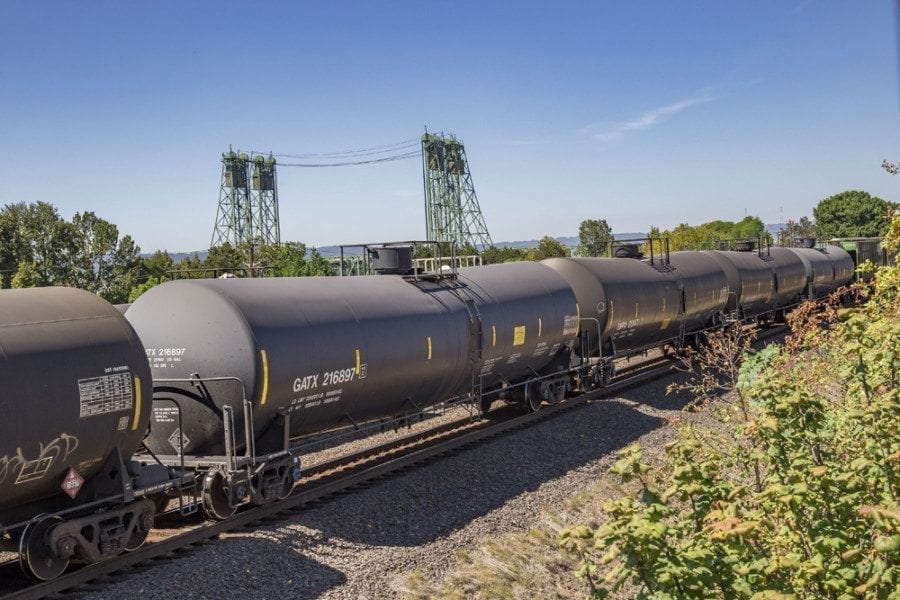VANCOUVER — The Washington State Supreme Court has ruled in favor of the Port of Vancouver in suit regarding the Port’s lease with Tesoro-Savage’s planned Vancouver Energy oil-by-rail terminal.
The suit, brought by three environmental defense groups, alleged that Port of Vancouver commissioners had violated state environmental laws in 2013 when they granted a lease for the proposed oil terminal before garnering an environmental impact statement.
If approved, the Tesoro-Savage oil terminal would be the largest oil-by-rail project ever constructed in the United States, carrying up to 360,000 barrels of crude oil each day to the Port of Vancouver from the Bakken oil fields in North Dakota through the Columbia River Gorge. The oil would then be held at the Vancouver terminal before making its way to the Pacific Ocean for transport via ships on the Columbia River.
To read more Clark County Today coverage of the Tesoro-Savage Vancouver Energy oil terminal project:
Port of Vancouver commissioners renew controversial oil terminal lease
Published March 10, 2017
Written by Kelly Moyer
Federal grant funds could help Vancouver Fire Department plan for potential oil-train derailments, explosions
Published Dec. 30, 2016
Written by Kelly Moyer
Opponents, proponents speak their minds at Vancouver oil terminal hearing
Published Nov. 29, 2016
Written by Kelly Moyer
The much-disputed oil terminal project has drawn from scores of local residents, regional Native American Indian tribes and environmental rights groups, who argue that bringing that much crude oil through the Columbia River Gorge and along the Columbia River — especially from the Bakken region, which has been linked to several oil-train explosions in the U.S. and Canada — is a safety and environmental disaster in the making. The project, which began in 2013, is still awaiting approval from the state’s Energy Facility Site Evaluation Council (EFSEC).
In 2013, several environmental groups, including Columbia Riverkeeper, the Sierra Club and the Northwest Environmental Defense Center, sued the Port and its Board of Commissioners, arguing that the commissioners had entered into a lease agreement before EFSEC issued an environmental impact statement (EIS), therefore violating Washington’s State Environmental Policy Act (SEPA) by “taking actions that would limit the choice of reasonable alternatives.”
The case reached the Supreme Court of Washington State after two lower courts, including the Washington State Court of Appeals, dismissed the environmental groups’ case against the Port, ruling that the lease did not limit the Port’s choice of reasonable alternatives and was, therefore, not in violation of SEPA.
The Supreme Court ruling handed down on Thu., March 16, sided with the Port of Vancouver, with the majority ruling that the lease did not violate state environmental policy and stating that the conditions of the lease “when coupled with EFSEC’s certification criteria and the governor’s discretion, ensure the lease does not constrain the reasonable alternatives available to the Port.”

Washington State Supreme Court Justice Mary Fairhurst wrote the majority opinion with Chief Justice Barbara Madsen and justices Charles Wiggins, Steven González and Susan Owens concurring.
Justice Debra Stephens wrote the dissenting opinion, with justices Sheryl Gordon McCloud and Mary Yu, along with Associate Chief Justice Charles W. Johnson concurring.
Stephens argued in her dissenting opinion that the Port’s lease with Tesoro Savage “self-evidently limits the parties’ alternatives, and standard contract frustration language is an inadequate safeguard for reasonable alternatives under SEPA.”
Stephens added that, in her opinion, “the majority’s analysis has the consequence of granting the Port a sweeping exemption from SEPA, allowing the Port and Tesoro to advance the design of the nation’s largest ever oil-by-rail project completely without benefit of environmental review … contrary to the core mandate of SEPA.”




